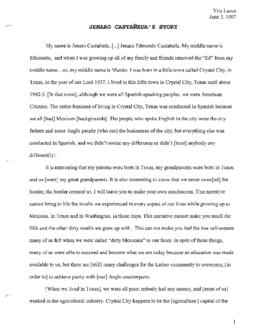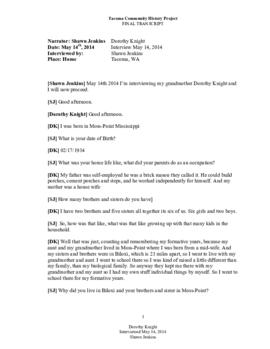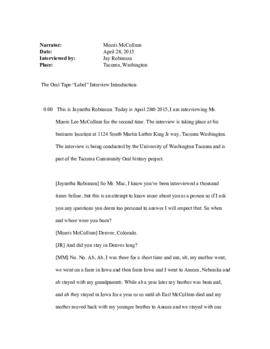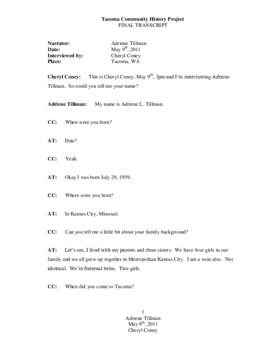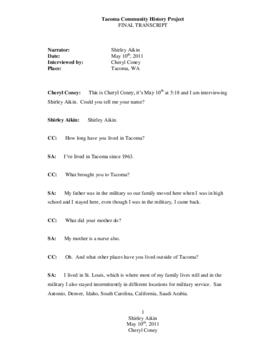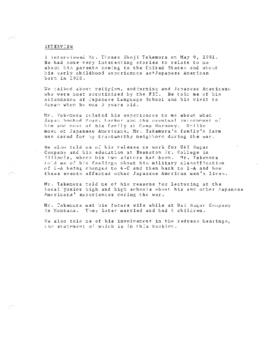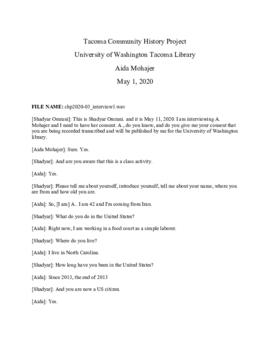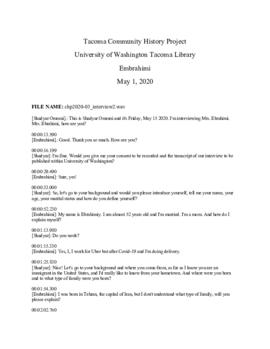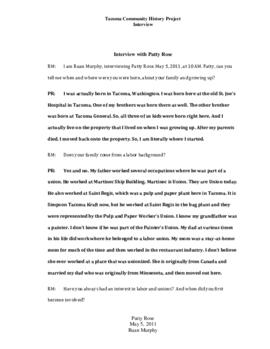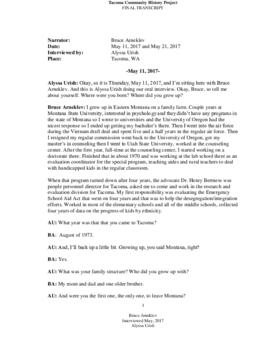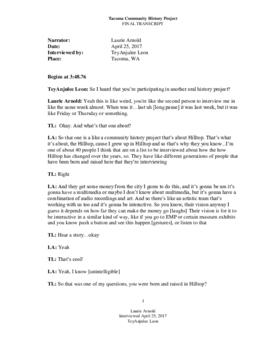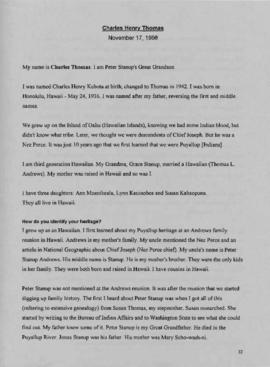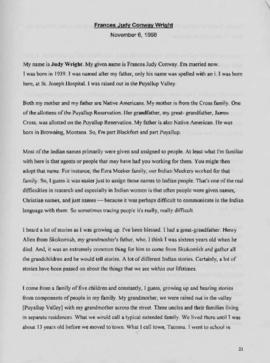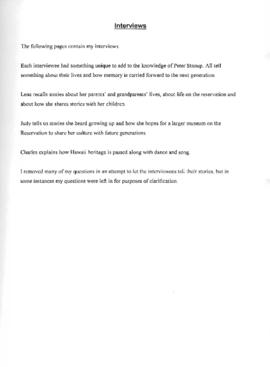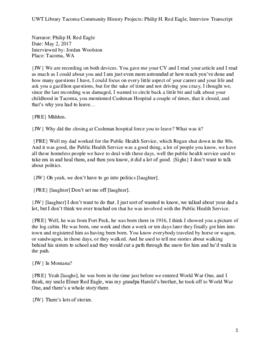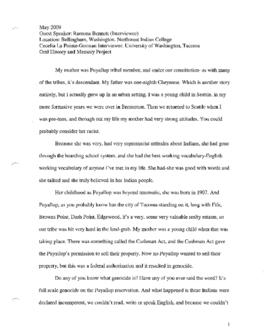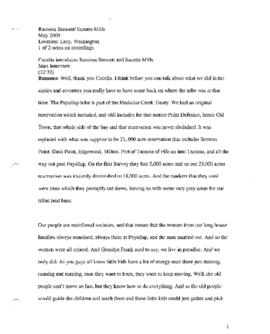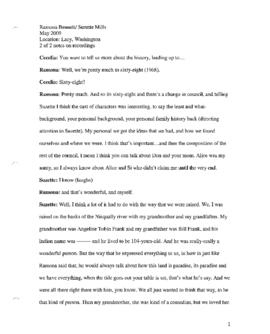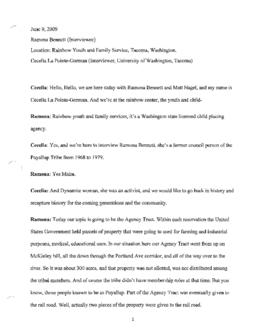Showing 230 results
Collections153 results with digital objects Show results with digital objects
- Item
- 2007
Oral history interview with Jenaro Castaneda by Yris Lance conducted April-May 2007. Jenaro Castaneda, a former migrant worker, describes life growing up in a post-World War II farm labor camp and comments on the social barriers he has faced as a Mexican-American. He also touches on his work with the Washington State Office of Minority and Womens Business Enterprises and expresses his hopes for greater recognition and understanding of Washingtons minority communities.
Mid-Knight Run: The Story of One Family's Journey to the Northwest from the Deep South
- Item
- 2014
Oral history interview with Dorothy Knight by Shawn Jenkins conducted 05/14/2014. Dorothy Knight recounts her family's journey from Moss Point, Mississippi, to Tacoma, Washington, and compares and contrasts life in the Northwest and the Deep South. The interview focuses in particular on the interplay between region and racism within the United States.
Morris McCollum: Tacoma's Hilltop Community Icon
- Item
- 2015
Oral history interview with Morris McCollum by Jaynetha Robinson conducted 04/28/2015. Mr. Morris McCollum, "Mr. Mac" as he affectionately known, is one of Tacoma's most respected business and community leaders. He is certainly one of the longest lasting. Shortly after arriving in Tacoma in 1957 Mr. McCollum purchased the K Street Department Store which was located on the corner of 12th and K. He operated the store for several years. At the time the K Street business sector, one of the city's twelve business districts, was second only to downtown Tacoma in terms of business activity. Businesses such as hardware stores, banks, small department stores, appliance dealers, butchers, markets, cleaners, clothing stores, and restaurants lined the streets. In 1960, he moved to 11th and Broadway and opened what to become the quintessential men's store "Mac the Knife," later shortened to "Mr. Mac's." At the time the Tacoma business district was being adversely affected by the building of the Tacoma Mall which would, after its completion, lure many of the surrounding businesses to it. Mr. Mac stayed, however, and became president of the K Street Booster Club, an organization dedicated to promoting the interests of small family owned businesses and the community that surrounded them. In addition to having an active interest in the business community Mr. McCollum also became dedicated to the areas youths and his interests in sports, boxing in particular, lead him to becoming involved with the Tacoma Athletic Commission, eventually becoming its president in 1978. Recognized by the city of Tacoma with the 2004 Martin Luther King Jr. award Mr. McCollum remains a leading figure.
Nurses Need to be Taken Care of, Too: Stories of Black Nurses in the Workplace
- File
- 2011
Oral history interviews with Adriene Tillman and Shirley Aikin by Cheryl Marie Coney conducted 05/11/2011. Adriene Tillman and Shirley Aikin examine the social trends and attitudes that have shaped their experiences as African-American nurses. Particular attention is paid to the interviewees involvement with the Ebony Nurses Association of Tacoma, a local organization that provides professional and personal support to its members. Other topics of discussion include Tillmans union activity with the Washington State Nurses Association, Aikins teaching career at Pacific Lutheran University, and the current strengths and weaknesses of the nursing profession.
- Series
Oral history interview with Thomas Shoji Takemura
- Item
- 1991
Oral history interview with Thomas Shoji Takemura by Susan Stout conducted 05/09/1991. The interview recounts Thomas Shoji Takemura's early childhood and family life on a truck gardening farm in Fife, Washington before the start of the Second World War, as well as their forced evacuation to the Assembly Center in Puyallup, Washington. Takemura's experience of camp life is recalled in some detail. During this time, neighbors agreed to take care of the family's property. Takemura eventually obtained a release to work at a U & I factory processing sugar beets in Chinook, Montana, where he met his future wife. He also discusses his involvement in the national redress movement and related lecturing at local area schools.
- File
- 2020
Oral history interviews with Aida Mohajer and Ebrahimi by Shadyar Omrani conducted 05/01/2020. Since COVID-19 started to become a global pandemic, it has caused personal and public traumas. Increase in unemployment rate, bankruptcy of small businesses, financial stress to the middle and working-class and the closure of many businesses which relied on peopleΓÇÖs social activities, including the gig industry, tourism industry and restaurants, are additional traumas to the issues of health and life threats people face by the contingency of the virus. By the end of May 2020, more than 2 million Americans were confirmed COVID-19 positive, 113 thousand of whom could not survive. Amongst the most affected populations, the people of color, especially Black Americans and immigrants have been suffering most. This research focuses on immigrant working women from the Middle East, whose life journeys are filled in with several traumas, some intensified during the pandemic. This paper provides two oral history records of two Iranian American working mothers, Aida Mohajer and Mrs. Ebrahimi, who carry historical traumas experienced in two different countries with two different cultures, i.e. Iran, and the USA. The intervieweesΓÇÖ stories show how the experience of trauma is related to the social class and what imposed social factors beyond choice can determine the class and different approaches to traumas.
Patty Rose, Pierce County Central Labor Council
- Item
- 2011
Oral history interview with Patty Rose by Ruan Murphy conducted 05/05/2011. Patty Rose gives an overview of her nearly four decades of involvement with the Tacoma labor movement and discusses her current position as secretary-treasurer for the Pierce County Central Labor Council. She describes the PCCLCs role as an umbrella organization and talks about the specific political and educational resources that are gathered on behalf of members. She also comments on some of the pressing issues currently faced by labor unions and American workers in general, including outsourcing, rising healthcare costs, and loss of pension benefits.
Perspectives on Tacoma School Desegregation: From Family Values to Program Evaluation
- Item
- 2017
Oral history interview with Bruce Arneklev by Alyssa Urish conducted 05/11/2017,05/21/2017. Born in rural, eastern Montana, Bruce Arneklev, 79, can be seen as an unlikely match to have led the Tacoma School District's desegregation program evaluation in the 1970s. Arneklev earned his bachelor's and master's degrees at the University of Oregon and his Educational Doctorate in educational psychology at Utah State University before moving out with his family of five for an evaluation role with the Tacoma School District. Arneklev was hired to evaluate the district's Emergency School Aid Act for its first four years, 1973-1977. ESAA was a federal program that funded school desegregation efforts. Tacoma began voluntarily desegregating its schools in 1966 with a limited school choice enrollment for its segregated central-area schools and expanding to district-wide enrollment policies to reduce effects of de facto segregation over the next three years. Arneklev worked for an additional twelve years in the district's evaluation department before working as a school psychologist for ten years, retiring in 2000. He lives in the North End of Tacoma with his wife, Dixie, dog, Charlie and has several children and grandchildren in the Tacoma area.
Perspectives on Tacoma School Desegregation: From Wallflower to Rabble Rouser
- Item
- 2017
Oral history interview with Laurie Arnold by TeyAnjulee Leon conducted on 04/25/2017. The child of left leaning social activists, Laurie Arnold grew up during a time of great change in the country and the Tacoma community. The same year Laurie started first grade, McCarver Elementary in Tacoma became the first magnet school in the country and began the desegregation process of Tacoma Public Schools. Though Laurie only attended through fifth grade, her experiences there lasted a lifetime. Throughout her educational journey, Laurie attended many schools, and the one that remained clearest in her memory was McCarver. One of her fondest memories was Friday Activities, and she could still recall the teachers she had as well which teams she belonged to. Laurie lived in Hilltop most of her childhood and only spent about seven or eight years away before returning home to Tacoma for good. In that time, she lived and attended schools in Seattle until age fourteen. Roughly a month into her ninth grade year, Laurie dropped out of school and moved to Florida until age seventeen. Upon her return, Laurie completed her GED, Associates, Bachelors, and Masters degrees all in the South Puget Sound region. She taught at the Tacoma Urban League for many years before she found her way to Bates Technical College where she currently works. Laurie continues to serve the Tacoma community and is a proud Hilltop native.
Peter C. Stanup: A Leader Among the Generous People
- File
- 1998
Oral history interviews with Lena Landry, Judy Wright, and Charles Thomas by Darlyne Reiter conducted 11/1998. Puyallup Tribal Elder Lena Landry and Puyallup Tribal Historian Judy Wright discuss the plight of Pacific Northwest Native Americans during the late nineteenth and early twentieth centuries and reflect on the life of Peter Stanup, a Puyallup tribal leader and activist whose 1893 death remains a source of enduring controversy. Charles Thomas, Peter Stanup's great-grandson, also shares his family's quest to uncover their history and their discovery of their connection to Stanup.
- Item
- 2017
Oral history interview with Philip H. Red Eagle by Jordan Woolston conducted 05/02/2017. Philip H. Red Eagle was born in 1945 in Tacoma, Washington. His mother, Marian Steilacoom, of Salish decent, was born near Port Angeles, Washington. Philip's father, Philip Red Eagle, a member of the Dakota Tribe, was born near the Missouri River on the Fort Peck Indian Reservation in Montana. Phillip spent the first fourteen years of his life in Tacoma, attending Stanley and McCarver schools before moving to Sitka, Alaska with his family in 1959. Philip joined the Navy shortly after graduating from high school, serving in Vietnam for five years from 1969-1973. After Vietnam, Philip returned to Washington and began undergraduate studies at the University of Washington where he earned two bachelor's degrees. The return to civilian life after the war affected Philip and he struggled with PTSD and related issues like depression and insomnia. Philip found that art, writing, and taking part in the revival of his culture helped him confront his PTSD and over the last 30 years Philip has contributed greatly to the revival and expansion of Indigenous culture in the Pacific Northwest.
- Series
- Series
- Series
- Series
Ramona Bennett: Puyallup Tribal Indian Activist
- File
- 2009
Oral history interviews with Ramona Bennett and Suzette Mills by Cecelia La Pointe-Gorman, Matt Nagel, Cheryl Milas, Clare Johnson, Dawn Quinn, David Octuck, and Brent Anderson conducted May-September 2009. Tribal leader Ramona Bennett discusses her forty years of advocacy work on behalf of the Puyallup Tribe and the Pacific Northwest Native American community. The interviews focus in particular on Bennetts time on the Puyallup Tribal Council (1968-1979), during which she campaigned for much-needed social and healthcare services. Other areas of focus include Bennetts involvement with the fish-in movement and the history of Cushman Hospital.
